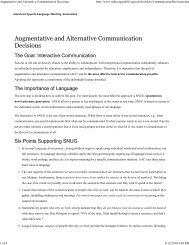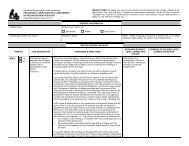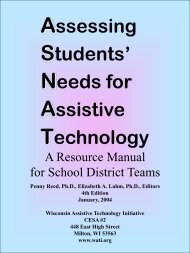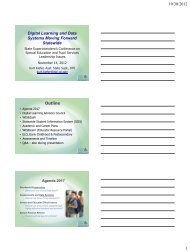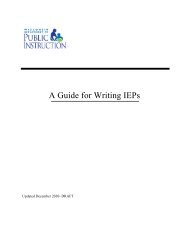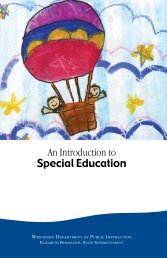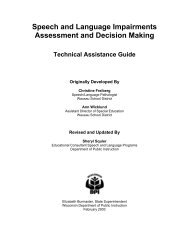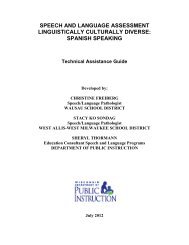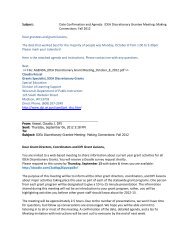Extended School Year Services (ESY) - The Special Education Team
Extended School Year Services (ESY) - The Special Education Team
Extended School Year Services (ESY) - The Special Education Team
Create successful ePaper yourself
Turn your PDF publications into a flip-book with our unique Google optimized e-Paper software.
Figure 2<br />
Factors to Consider: Critical Questions<br />
7/1999<br />
Revised 8/2004<br />
In this section, you will find examples of predictive factors, as determined by the Tenth<br />
Circuit Court of Appeals, with critical questions that might be asked to help determine<br />
whether the Predictive Factors are relevant in determining eligibility for <strong>ESY</strong> services.<br />
In some cases, examples are provided to further clarify when significant regression<br />
could occur and <strong>ESY</strong> services may need to be provided. <strong>The</strong>se factors are to be reviewed<br />
anytime a student is being considered for <strong>ESY</strong> services.<br />
Type and<br />
Severity<br />
Behavioral/<br />
Physical<br />
Alternative<br />
Resources<br />
Ability to<br />
Interact with<br />
Non-Disabled<br />
Peers<br />
� In what ways does the student’s disability and/or intensity of needs<br />
impact the maintenance of learned skills?<br />
� A student with autism has a history of losing skills in the area of<br />
communication when structured activities are not provided over an<br />
extended school break.<br />
� A student with TBI has ongoing problems retaining learned skills and<br />
needs ongoing practice of these skills to prevent serious regression.<br />
� A student with multiple and severe disabilities requires very intensive<br />
services over the school year by parents and school staff collectively, to<br />
make progress on IEP objectives<br />
� Are there behavioral or physical factors that negatively impact the<br />
student’s ability to maintain learned skills?<br />
� Have there been extended absences that impact ability to maintain<br />
learned skills?<br />
� Have there been major life events that impact ability to maintain<br />
learned skills?<br />
� Have there been significant behavioral challenges that interfere with<br />
maintenance of learned skills?<br />
� What community/home resources are already planned or could be<br />
available in order for the student to maintain learned skills?<br />
� How does the parents’ ability to provide educational structure at<br />
home impact the child’s ability to maintain learned skills?<br />
� A child with a learning disability has a family who is in crisis and<br />
therefore is not able to provide ongoing support in reading.<br />
� Does the lack of opportunities for the student to interact with nondisabled<br />
peers significantly interfere with maintenance of learned<br />
skills?<br />
� A child with multiple disabilities has a goal of developing social<br />
initiation skills, but lives in an isolated rural area where no<br />
opportunities exist for interaction with typical peers.<br />
� What community/home support is needed to provide necessary<br />
opportunities for this student?<br />
� A child who is deaf and whose primary mode of communication is sign<br />
language has limited opportunities to communicate with others using<br />
sign language in the community.<br />
CESA #9: 1999 Determining <strong>ESY</strong> <strong>Services</strong>, Revised 2004 6



